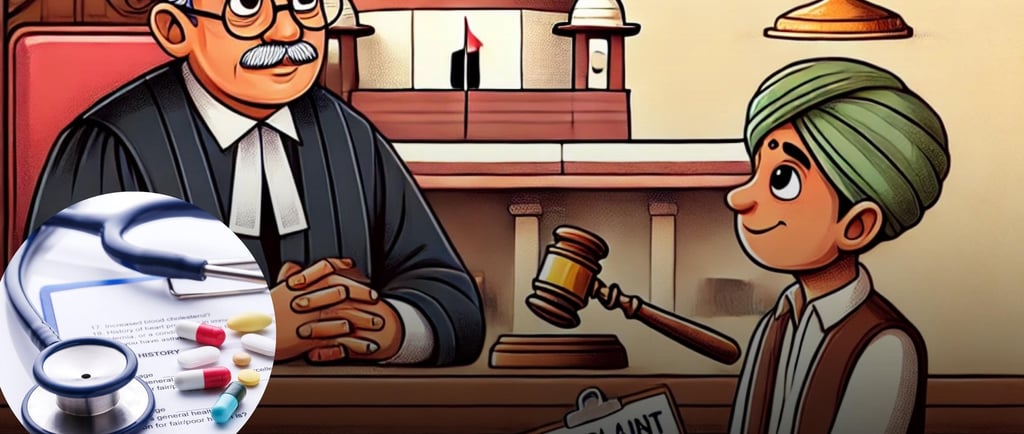Machinery Needed For Citizens To File Complaints Against Misleading Medical Ads: Supreme Court
New Delhi, December 19, 2024 – The Supreme Court of India, while hearing the Indian Medical Association’s case concerning misleading medical advertisements, stressed the necessity of establishing a mechanism under the Drugs and Magic Remedies (Objectionable Advertisements) Act, 1954 to allow citizens to file complaints.
2/25/20252 min read


A bench comprising Justices Abhay S. Oka and Ujjal Bhuyan directed Senior Advocate Shadan Farasat, who is assisting the Court as Amicus Curiae, to submit a note on the implementation of the Act before the next hearing. Justice Oka emphasized that proper machinery must be set up for prosecution and grievance redressal. He suggested that dedicated phone lines or another complaint-filing system should be established to allow citizens to report violations. “This is one of the Acts of most vital importance,” Justice Oka observed. The Court stated that it would issue comprehensive directions on the matter.
Justice Oka also asked Farasat to address the Court on the provisions of the Act, the compliances required under it, and whether the necessary enforcement machinery existed across States and Union Territories (UTs).
Previous Court Directives
On May 7, 2024, the Court had instructed all State and UT governments to file affidavits detailing actions taken since 2018 regarding misleading advertisements violating the Drugs and Magic Remedies Act, the Drugs and Cosmetics Act, 1940, and the Consumer Protection Act, 2019. The Court later questioned the inaction of states and UTs in imposing penalties and deterrents for violations of these laws.
During the latest hearing, Farasat informed the Court that no specific directions had been given to states and UTs concerning the Drugs and Magic Remedies Act. Consequently, the Court announced that it would issue a comprehensive order on March 7, 2025 to ensure the implementation of the Act.
Compliance by States and UTs
The Court also examined the compliance of various States and UTs with its earlier orders concerning Rule 170 of the Drugs and Cosmetics Rules, 1945, which regulates drug advertisements. Reports from Jharkhand, Karnataka, Kerala, Madhya Pradesh, Pondicherry, and Punjab were reviewed.
• Jharkhand: The state claimed that no manufacturer had applied for permission under Rule 170. However, the Court pointed out that the state had not confirmed whether any advertisements governed by Rule 170(2) were being published. As a result, Jharkhand was directed to file a better affidavit after verifying compliance.
• Karnataka: The state admitted that no prosecutions had been initiated in 25 cases of misleading advertisements due to a lack of material particulars such as license numbers. The Court dismissed this justification, directing the state to use police and cybercrime resources to trace violators. “These are only excuses,” Justice Oka remarked, adding that the state had the means to investigate but lacked the will to act.
• Kerala: The Court found that Kerala was implementing Rule 170 effectively and did not issue any further directions.
• Punjab & Madhya Pradesh: The Court decided to review their affidavits on the next hearing date. Farasat had not yet examined Punjab’s latest filing, so the Court deferred the matter.
• Pondicherry: The Chief Secretary was initially issued a notice for failing to report compliance, but after the UT’s counsel appeared, the Court granted more time to file an affidavit.
• Andhra Pradesh: The state’s Chief Secretary had been summoned on February 10, 2025, due to non-compliance. During the hearing, Andhra Pradesh sought leniency, requesting the Court to not record its failure to file an affidavit. However, the Court refused, noting that the state had been given time until the end of the month but still had not complied. Justice Oka stated that the Court had no choice but to record the non-compliance, adding that such requests were unfair on the part of the state.
Next Steps
The Supreme Court is set to issue detailed directions on March 7, 2025, regarding the implementation of the Drugs and Magic Remedies Act and the creation of a citizen complaint mechanism. The Court will also continue reviewing compliance reports from states regarding Rule 170 enforcement.
Case Title: Indian Medical Association v. Union of India, W.P.(C) No. 645/2022
